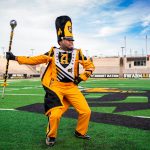By Solomon Crenshaw
For The Birmingham Times
When he was a child, Ja’Vonta Price was always banging on something: “I pounded on anything that made noise,” said the Birmingham native who is now the head drum major for the Alabama State University (ASU) Mighty Marching Hornets.
“We had receptions after church, and I was always the one that stayed [in the sanctuary] and played on the drums,” he added.
Those drums would eventually lead Price to become a field general at ASU, said his family.
“At a young age, he would get a stick, probably a broomstick, and just march,” recalled his mother, LaJeana Boyd, who played flute, clarinet, and trumpet at Birmingham’s Bush Middle School. “Or he would beat. He was interested in drum first, so he would beat on a bed, beat on anything he’d see or come in contact with.”
Around the ninth grade, Price made it clear that his dream was to be a drum major.
“He went from beating the sticks to actually marching with his stick and flipping it and all that,” his mother remembered. “He was saying he wanted to be the drum major, and not just a regular drum major—he said he wanted to be the head drum major at [ASU]. That was always his college choice. Nowhere else. [ASU].”
On Saturday, October 28, Price and the ASU Mighty Marching Hornets will take the field at Birmingham’s Legion Field for the Magic City Classic, the largest historically Black college and university (HBCU) football game in the nation, which matches the ASU Hornets against the Alabama Agricultural and Mechanical University (AAMU) Bulldogs.
“A” Game
“It’s actually a blessing to be part of it,” Price said of the Classic. “By me being from Birmingham, it’s one of the best things to be part of. The [Classic] is what made me want to be in band, to be a part of a college band program. To be able to march during the parade, during the game is really fantastic.”
This will be the senior recreational therapy major’s fifth—and final—Magic City Classic. “I wish I could do it forever,” the 24-year-old said. “It’s good to be part of it. You have to be on your ‘A’ game because you have thousands of people watching.”
Those watching eyes spur the drum majors and the rest of the band to think more about what they’ll do the week before the game. “We try to go in detail and try to make it different because that’s the biggest game of the year,” Price said.
Despite the magnitude of the Classic, the ASU Mighty Marching Hornets aren’t focused on outdoing the AAMU Marching Maroon and White Show Band of the South—they’re just doing what they do best.
“Most times when you try to outperform somebody, you mess up because you’re too worried about them,” Price said. “We just try to do our own thing and be unique, keeping it Bama State style.”
“All I Ever Knew”
Back when he was pounding on anything he could get his hands on, Price somehow knew he would be in a band.
At his grandmother’s house, he recalled, “I used to get pots out of the cabinet and just play beats on them. My grandma used to always tell me, ‘Make sure you put my pans back up, boy, when you’re though making your beats.’”
“I was always that kid that loved the band,” said Price, adding that he would always have a pair of sticks with him in the car. “Even when music came on, I used to [pretend to] beat the drums in the car. Drumming has always been my go-to thing in life, the thing that kept me sane in life. I’ve been doing things dealing with band, been doing that for the longest. Once I got to college, it really wasn’t new because it’s all I ever knew.”
Price had two extracurricular activities as a student at Center Point High School: he played basketball, and he played in the band. But music was his love. He started by playing the tenor drum and expanded his interest to three types of drums during his four-year career.
At ASU, Price is the head drum major among five who lead the band; the others are fellow seniors Justin Heidemen, Kenneth Richardson, Kamran Shabazz, and Marcus Edison.
Time management is a key to Price balancing his responsibilities as head drum major with his academics.
“I have to do my internship, [40 minutes away in Hayneville, Alabama], from 8 a.m. to 4:30 p.m.,” he said. “[Afterward], I may take a nap or do a little studying. At 6 p.m., it’s time for band practice to start. Then you wake up the next morning and do it all over again.
“You really have to successfully prepare. If you don’t, things will slip up on you.”
The Field Commander
Price dismissed the notion that a drum major need only be able to dance and step high.
“He or she is a good leader and can do well under pressure, multitasking, basically being an extension of the band director while they’re not present,” he said.
“You have to be somebody that’s not afraid to stand up and be the person that sticks out,” Price continued. “You have to do the right things. You have to be on time. You have to do stuff differently than everybody else because everybody else is looking for you. They’re not looking at the band, they’re looking at you because you’re the field commander. You’re a person that’s supposed to do exactly what you’re supposed to do.”
Showmanship and creativity are part of the formula, as is an ability to dance: “But it’s not the majority part of what you have to do to be drum major,” said Price.
“That’s everything I try to preach every time I come across a high school drum major,” added the Center Point High alum. “[I tell them], ‘Make sure you can lead, make sure you want to be the different person in the band, if you want to be the leader. Just do the best you can, even though there’s a lot of stuff going on. You’ve got to be on your best game each time you go out and perform or practice. You’ve got to be a good example of a bandsman.’”
Each night when the ASU band completes practice, band members repeat their motto: The price of glory is high.
“You have to pay the price before you get the fame,” Price said. “People don’t really see what we do behind the scenes. We practice late. We practice hard. We stay up. We make sure we get our work done.”
“We don’t slack off,” he continued. “Any time you slack off, that’s a chance for people to say Bama State is slipping. When we say, ‘The price of glory is high,’ that means we’re giving our all, 100 percent. Every time we touch the field, every time we touch the stands, every time we put on a uniform, every time we come to practice, we’re giving our all because you never know when it’s gonna be your last time.”
The 82nd Magic City Classic between Alabama Agricultural and Mechanical University and Alabama State University will take place on Saturday, October 28, at Birmingham’s Legion Field. Kickoff is at 2:30 p.m. Central Time.











